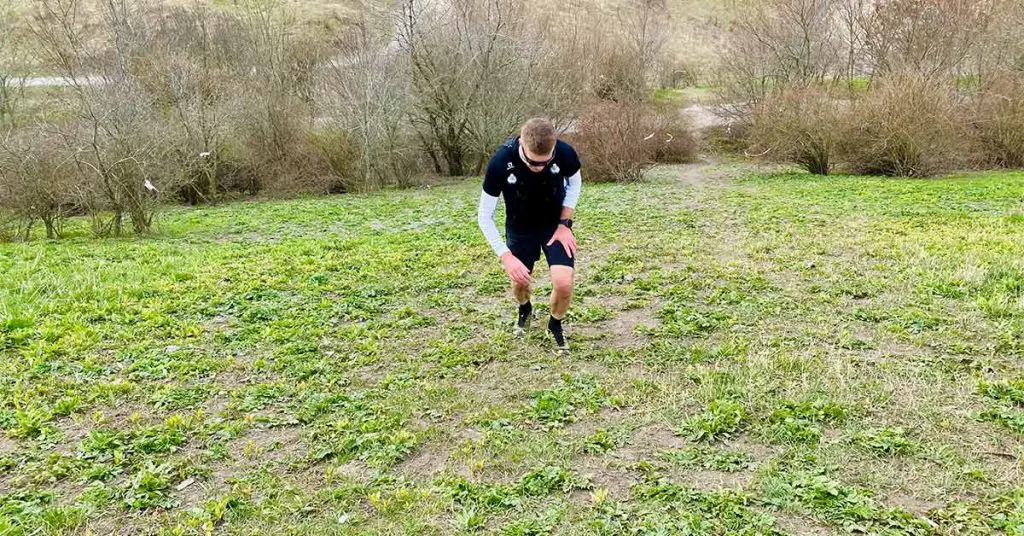Estimated read time: 8 minutes.
Nothing beats the joy of stepping on 100 miles race finish line!
Whether you are planning for an upcoming race day or looking to enrich your sports knowledge, there are a few things you must know about a 100-mile race. So, we’ve researched and found the following:
The time for running a 100 mile race varies depending on various factors, including speed, terrain, and weather. It can take as long as 11 hours or even go up to 48 hours. The more complicated the terrain, the longer the race will take.
This article provides information about everything you need to know about running a 100 mile race. We’ve covered the training plans, nutrition, top runners, and more.
Basics of 100 Mile Race – What Does it Entail?
As the name suggests, a 100 mile race involves covering the long stretch in one round. This could take anything between 24 to 48 hours. This race usually has time cut-offs, which means you will spend a reasonable amount of time running.
Normally, 100-mile runners carry safety kits that include waterproof jackets, warm clothing, and other necessities. Also, they need to carry water and food since the aid stations are located far apart from one another.
With 100-mile races, you must be prepared to run day and night. You may find that some races are well marked, while others will require you to use navigation devices or a smartwatch with pinned locations.
Who Should Run a 100-Mile Race?
Running for more than 24 hours is not something you wake up and do. It requires preparation, a proper training plan, a good nutrition strategy, and above all, focus.
Most runners start with short distances before hitting the long-distance races. Once they have built strong muscles and gained speed, they turn to ultra distance, where they challenge or set new records.
100-mile races are described by experts as brutal races that require mental toughness and physical fitness. In fact, it is said that a 100 miler is about 16x harder to complete than a marathon.
The bottom line is that 100 mile race is not for the faint-hearted. It requires discipline and training to achieve. Additionally, runners must be fit all round to manage to cover the long distances without breaking down.
Best Training Plans for 100 Mile Racing
The first thing to being a 100-mile runner is fitness. The problem is that this training can be time-consuming and very demanding. The average time to move from a marathoner to complete a 100 miler training is around 6 to 9 months.
However, if it’s the first attempt, you need a 12 to 18 months training plan. The training is very intense and requires a commitment to running between 4 and 6 times a week.
The best training strategy must include long runs on consecutive days and speed work. You must train your body and mind to push your limits to the maximum to get enough energy to cover long distances. The secret is to start running short distances and then gradually increase to long-term participation.
Let’s take you through the best training for 100-mile running:
Cross Training
Cross training is a vital exercise for anyone preparing for 100 miles of running. This training will develop supportive and strong muscles that will take you on long runs. Cross training is any exercise that gets you to sweat and increase your heart rate.
Find something that is fun and easy to do. Top recommended cross-training exercises include swimming, punching a bag, yoga, or cycling. This exercise should take about 30 to 90 minutes, depending on how intense you want it to be.
Stack Running
You can come up with a stack training plan to build your running speed. This might be running 10 miles on Monday, taking one or two rest days, then covering 15 miles on Wednesday, followed by 20 on Thursday, and so on.
Once you have gained the speed you need, try covering the same distance in 24 hours, instead of days. The secrete to benefiting from this plan is doing it in a well-structured manner and increasing your weekly mileage to cover the target distance.
Though it may take longer, it is steady and reliable for excellent performance. Also, you shouldn’t limit yourself to covering 100 miles. This plan can help you to cover more than 100 miles in the long term.
Strength Training
Another vital exercise when preparing for long-distance races is strength training. The training will help runners stay free from injuries during the race. Additionally, strength training boosts your supportive muscles and supports your legs so that you don’t suffer from joint injuries. Hit the gym and work on your back, core, and legs to increase your performance.
Intervals
Interval training involves short, intense running where you alternate between fast running and a recovery plan. For instance, you can choose to do ten intervals of 5 minutes of fast running and 5 minutes of walking.
Your long-term goal is to achieve a pace of 80% to 90% of the total efforts. Conversing with your running partner is impossible during intervals because of the speed work involved. Make sure you start with the speed you can manage and then increase gradually.
Overnight Running
One thing you must know is that you will have to run in the dark at some point in 100 mile races. Make sure you include night running in your schedule. It is not easy to run on uneven terrain in total darkness. Additionally, you must practice with your headlamp to know how it works in different places.
Rest
Every runner must take a day off to rest and let the body recover. This is also required when you are about to participate in ultra marathons. Your rest day you not involve anything, no cardio, cross-training, or jogging.
The best rest you can take is enough sleep. As you are aware, you may suffer from sleep deprivation during your intense training. The general idea is to get your body and mind fit for the race day.
How to Prepare for your First 100-Miler
There are several things you can do to enhance your performance on race day. The recommended preparations are:
Know your Race Course
It is essential to know the type of terrain you will be running on. This will help you to get a similar ground and exercise well. Understanding your race course will enable you to calculate when to start running faster and where to reduce your pace.
Eat Enough
Running 100 miles require energy to push you through. It is recommended to have enough complex carbohydrates in-take on the night before the race. Also, you should include enough fats and protein to boost your stamina. The idea is to pump your muscles with sufficient glycogen that generates energy.
Drop Bags
Every runner must have a drop bag with vital supplies, such as energy drinks, water, extra pair of running shoes, clothing, etc. Make sure the drop bag is lightweight and well organized. It’s disappointing if you need something, then you realize that you forgot it.
Mindset
Mental preparedness and health are critical to your success in 100 miles race. You must come up with ways to fight your brain from telling you to give up. Don’t give in to the negative thoughts that may break you down during the race. You can practice using mantras or counting steps during your training time to keep your brain active.
How to Prevent Injuries in 100 Miles Race
Injuries are unavoidable in running, and they affect general performance when they occur. Since you are going on a long-distance race, you must try and prevent injuries by all means. The following are some activities you can do:
Massage
It is recommended for runners to go for a massage once every week to keep their legs and bodies fit. The best time for massage is in the evening before taking your rest. Proper massage offers the same feeling as speed work.
Physical Therapy
Runners are supposed to have a clear and focused mind to output well. It is always good to open up to your physical or psychological therapist about anything that is bothering you or may affect your attention during the race.
Stretching
It is important to spend a few minutes after your daily exercise stretching your muscles. This simple exercise will help you to recover well and prevent any injuries you may get.
Tips to Pace your 100-Mile Race
Professional runners know the importance of pacing in a race. It gives you the morale and force to reach the finish line. Also, pacers ensure that you eat, drink, and assist with anything else you may want. Do understand that some 100-mile races only allow pacers to join at the 50-mile marker. Nevertheless, you must set achievable goals based on your physical and mental fitness.
Here are some possible pacing options you may consider in a 100-mile race:
- Start at Slowly: The disadvantage of starting at high speed is that it results in slow completion. Make sure you control your adrenaline rush and only unleash your full force when you are about to finish.
- Get a Good Pacer: A reliable pacer must be experienced and ready to help you achieve your goals. Also, you must choose someone you are used to or train with.
- Feel Free to Walk: With 100 miles race, runners have walk breaks to avoid getting fatigued. In fact, it is recommended to take breaks early in the race to save as much energy as you can.
- Apply Hike the Hill Approach: Hike the hill strategy is best for 100 miles race as it helps you to have the finishing power.
Recommended Diet for 100 Mile Runners
Healthy eating is mandatory for every runner. Most 100-mile runners choose meals rich in carbohydrates, calories, and fats to sustain their bodies. Below are recommended foods you can eat before, during, and after the race.
Pre-Race Diet
Before you start running, you need to try different foods or ask your nutritionist to know what works before for you. You may choose to eat a banana, toast, honey, oatmeal, or anything within your reach.
During the Race
Choosing the types of food to eat during the race can be tricky. It is recommended to take energizing foods or beverages. Also, you can try out peanuts, cookies, chips, or sandwiches. In some races, you are told what you’ll get at the aid station.
Post Race
You should choose wisely what you’ll eat after running. Get a recovery drink to boost your body. You can take the booster within 30 minutes before finishing the race. This maximizes your overall performance.
Our Take on 100 Miles Race
Running 100 miles can be a hell of a challenge if you are not fit for it. You must train consistently and manage to cross the finish line as fast as you can. Of course, there might be some challenges on the way, but your focus is to complete the 100 miles.
All in all, the average time for running 100 miles race is between 24 and 48 hours, depending on the terrain and fitness of the runners.
100 Miles Race-Related Questions
- How Many Laps Around a Track is a 5K: Your Guide - October 22, 2023
- When is Track and Field Season? - October 22, 2023
- Understanding the Length: How Long Is a Running Track? - October 22, 2023




